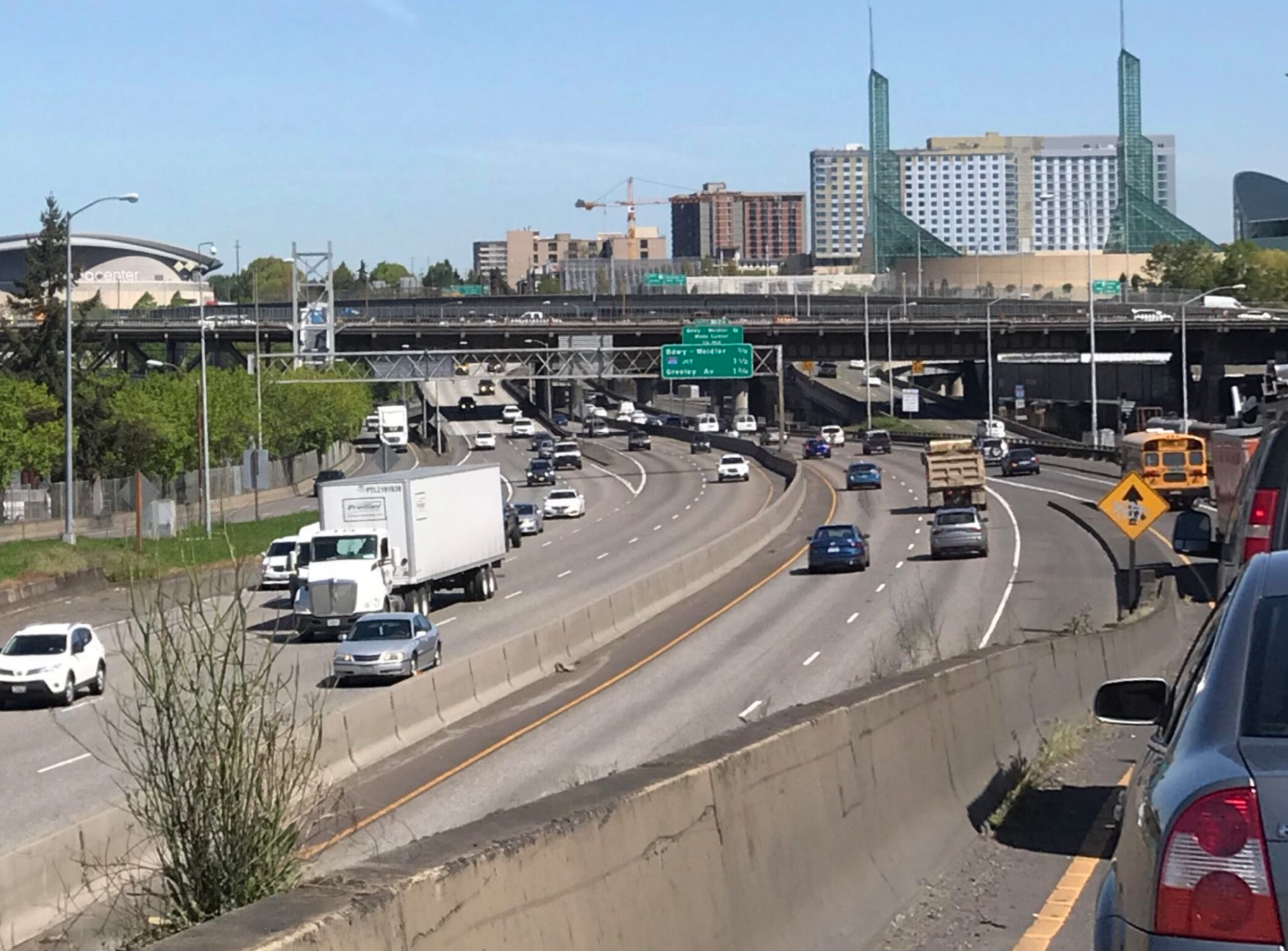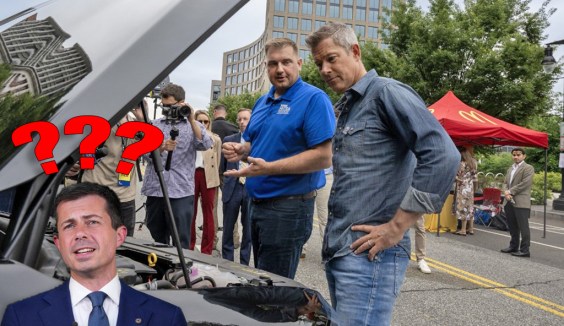Editor's Note: This post first appeared on BikePortland.org and is republished with permission. Read Streetsblog USA's previous coverage of the Rose Quarter expansion project here.
Much to the delight of a large coalition of Oregon Department of Transportation critics, the federal government has given them another assignment before graduation.
On Tuesday, the Oregon Division Administrator for the Federal Highway Administration Phillip Ditzler sent a letter to Oregon Department of Transportation Director Kris Strickler with eight words that could throw a wrench into the project’s progress: “I hereby rescind my approval of the FONSI.”
FONSI is short for Finding of No Significant Impact, a key decision all mega-freeway projects must go through to complete legal process laid out in the National Environmental Policy Act (NEPA).
Ditzler’s decision is a setback for ODOT, who’s been directed by the Oregon Legislature to address congestion on the freeway with requisite urgency as the top transportation priority in the state. ODOT has decided that more lanes for car and truck drivers is the answer and they’ve already spent millions of dollars planning it.
In the NEPA process, a FONSI is what comes after an agency has completed an Environmental Assessment (EA). The FHWA approved ODOT’s EA for this project and granted the initial FONSI in November 2020, but only after ODOT scaled back its intention to expand southbound I-5 lanes over the Eastbank Esplanade and Willamette River.
With that hard-fought feather in their cap, I-5 Rose Quarter Project Direct Megan Channel seemed eager to move on. “While this closes the chapter on the Environmental Assessment,” she said in November, “Now the real work begins.”
Channell’s statement is half right.
The recission of the FONSI means Channell and her team must re-open the EA and do more work to prove to Ditzler that the project won’t have “significant impact”. If they are unable to do that, they will be required to conduct a much more rigorous and detailed Environmental Impact Statement (EIS) — which is a time-consuming step ODOT and their bosses at the Oregon Transportation Commission (OTC) have been desperate to avoid and critics, major advocacy groups, and many regional elected officials have demanded for years.
A coalition of critics disagreed with ODOT’s EA findings and filed a lawsuit against the agency based on the FONSI in April 2021. Plaintiffs on that suit include No More Freeways, Neighbors for Clean Air and the Eliot Neighborhood Association. They dispute ODOT’s findings about the extent of negative environmental impacts this project will have on adjacent neighborhoods. ODOT has said a wider freeway with more capacity for driving will actually improve greenhouse gas emissions because, they claim, it will lead to less idling in traffic. (That is such a dubious claim ODOT themselves is grasping for friendly research to support it.)
In a press release issued Wednesday night, No More Freeways co-founder Aaron Brown said he is “delighted” with the FHWA’s decision. “No More Freeways has said for a long time that ODOT has not meaningfully studied the disastrous impacts this proposed freeway expansion would have on our community. We look forward to continuing to encourage Governor Kate Brown to demand that ODOT complete an Environmental Impact Statement that will study alternatives to freeway expansion.”
While ODOT has tried to move on from these controversial steps in the NEPA process, project detractors have not. Yesterday a group of youth climate activists, their supporters, and Portland City Council Candidate AJ McCreary stood in the rain on the Flint Avenue bridge overlooking I-5 traffic for week 19 of their “Youth vs. ODOT” rally.
Adah Crandall, a youth organizer with Sunrise Movement PDX, said in a statement yesterday, “We are grateful to see ODOT finally held accountable for their neglect to fully study the impacts of this project, which is a direct threat to our communities and climate.”
The lawsuit from No More Freeways accuses the agency of using faulty traffic projections that, “included multiple egregious errors and outdated assumptions”.
In his letter Tuesday, the FHWA’s Ditzler told the director of ODOT he made the decision based on a re-evaluation of a new analysis of the project and that ODOT must submit “additional analysis… so that the Federal Highway Administration (FHWA) can render an appropriate decision on the significance of the impacts based upon the new information.”
In a statement released Thursday morning, ODOT clarified the FHWA’s decision is related to changes in the project related to the highway cover design, which changed after the FHWA’s initial decision was made. Channell says the FONSI decision won’t cause a delay. “With guidance from and in partnership with the FHWA, we can still begin construction on time in 2023.” “Updating the Environmental Assessment is an important step to advance the community’s preferred Hybrid 3 highway cover design and is a step we anticipated and are excited to take,” she added.
Technically ODOT cannot move forward with the project until they satisfy Ditzler and all EA requirements. That means more process and more time. Given their urgency around this project, ODOT will likely move quickly to convince Ditzler to reinstate the FONSI. In a panel discussion hosted by the Portland Business Alliance this week, OTC Member Alando Simpson said, “I think we’re obsessed with process and we waste a lot of time and money on things… The more we delay projects, the more expensive they become.”
Jonathan Maus is BikePortland’s editor, publisher and founder. Contact him at @jonathan_mauson Twitter, via email at maus.jonathan@gmail.com, or phone/text at 503-706-8804.






